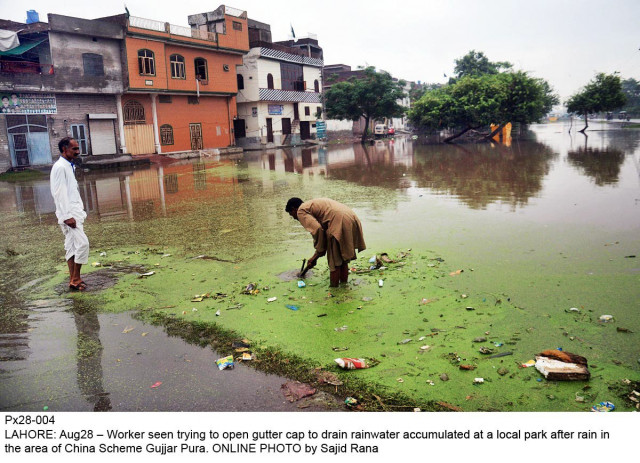Countering threats?: People bear brunt of dengue drive
Many arrested for having stagnant rainwater near houses, workplaces

Last year the cases continued to rise in September, October, November and December, resulting in at least 250 deaths, said Dr Salman Kazmi of YDA. PHOTO: ONLINE
“Last week it was raining heavily when officials of the dengue control programme visited the college and warned me with dire consequences in front of my students if I did not wipe out the stagnant rainwater inside the college premises,” recalls Ajmal while talking to The Express Tribune.
“Although we immediately washed out the rainwater, the area police arrived about an hour later and took me to the police station,” he claims. “I had to spend the whole night in the lockup just because of the rainwater.”

Several suspected cases of dengue have been reported at different hospitals of Lahore and the government seems helpless to counter the threat. Mosquito larvae have been found in every street and corner of the city, according to the city government data.
While the authorities claim about 80 dengue cases have been confirmed in Lahore this year, the Young Doctors Association claims to have treated more than 250 dengue fever patients in the past six months alone. About 20 patients remain admitted to Mayo Hospital, seven at Jinnah Hospital and another five at the Services Hospital.
Surveillance teams are working at the union council levels and due to these strict policies the number of dengue cases has gone down significantly, claimed General Health Dengue Control Additional Director Dr Fayyaz Butt while talking to The Express Tribune.
Double trouble
But the measures government has taken have landed many locals in trouble. About 3,000 cases have been registered in Lahore alone under the dengue prevention and control act, according to data of Punjab Information Technology Board.
Ajmal rightly believes the responsibility of cleaning up streets and parks lies with the government, which is instead arresting people to ‘show efficiency’. “One can spot stagnant water almost everywhere in Lahore, but the authorities do not bother about it,” he added.
Dr Fayyaz admits the anti-dengue teams have arrested several people and sent them behind bars, and also has a very convenient reason. “Our people do not listen to orders without [the use of] stick, so we are taking strict action against culprits involved in spreading the disease,” he said. “Our teams are working in an efficient manner: first they give a warning and then they arrest them.”
Anti-dengue act
About the arrest of Ajmal, Advocate Humayun Faiz Rasool told The Express Tribune the teacher had been booked under the Prevention and Control of Dengue (Temporary) Regulations, 2011. “The government of Punjab is targeting innocent citizens through lodging FIRs with an addition of [imposing penalties under] grave sections of Pakistan Penal Code, like 269 and 270.”
Both the sections deal with negligent and malignant acts that are likely to spread infection of disease dangerous to life.
The advocate added that according to Section 5 of the regulations, it is mandatory to issue a written notice to the owners of the property through a health inspector. “But in Lahore, the Punjab government is violating the rules and regulations,” he maintained. “They have arrested thousands of people without prior written notice.”
Doctors’ suggestions
A member of the Young Doctors Association (YDA) believes the Punjab government needs to start an anti-quackery campaign before the cases of dengue fever start rising.
Last year the cases continued to rise in September, October, November and December, resulting in at least 250 deaths, said Dr Salman Kazmi of YDA. “After these deaths, the Punjab government started an anti-quackery campaign, which failed miserably,” he alleged.`
Published in The Express Tribune, October 3rd, 2016.



















COMMENTS
Comments are moderated and generally will be posted if they are on-topic and not abusive.
For more information, please see our Comments FAQ